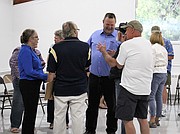Tester discusses infrastructure during recent stop in Superior
Kathleen Woodford Mineral Independent | Hagadone News Network | UPDATED 7 years, 6 months AGO
While eating breakfast at a hotel last week in Kalispell, Montana U.S. Sen. Jon Tester looked up from his bowl of cereal and saw one of his ads on the lobby TV.
“Hey, that guy looks kind of familiar,” he said to the man at the next table.
The man looked at the TV and back at Tester in surprise. It turned out the man was from Seattle, and was unaware of the Senate race between the man sitting next to him and Republican candidate Matt Rosendale.
Tester is running for re-election to a third term, and said this campaign is no different from the campaigns he has run in the past. Including his first election to the Senate in 2006, after defeating incumbent Conrad Burns, or his 2012 re-election against U.S. Rep. Denny Rehberg.
LAST FRIDAY around 2 p.m., Tester arrived in Superior and visited with locals in the Mineral Community Hospital’s conference room. About a dozen people gathered around the table, including representatives from the Idaho Forest Group; the Montana Department of Transportation; commissioner Duane Simons; county planner Tim Read; St. Regis School Board member Carol Young; House District 14 vandidate Diane Magone; Superior Superintendent Scott Kinney; Superior Fire Chief Steve Temple; and MCH CEO Steve McNeece.
Tester has been visiting with people around the state about a lot of issues and wants to focus on infrastructure. “The goal is to figure out what the small towns want if we get an infrastructure bill. Whether it’s conventional things like sewer and water, roads and bridges, broadband or affordable housing,” he told the group.
Affordable housing was a big item that came up during the roundtable meeting in nearly all of the sectors. The schools, the hospital and the mill all find their employees scrambling to find decent housing when taking jobs in the area. Also, finding an adequate workforce is challenging, including hospital nurses and doctors, who often travel from Missoula.
Several other topics were discussed, including the need to increase timber harvests; broadband connections; Medicaid expansion; and federal funding for programs like PILT and SRS. Another topic was recreational opportunities the county has to offer.
“We get people saying to push recreation,” said Read, “but people will fill up their cars in Missoula and recreate here and then head back to Missoula. What we need is an overall game plan and fill in some of the gaps to keep the people here and use our businesses. We need to make things more attractive and get them to stop.”
Tester remarked that was something that’s never come up in any of his other visits around the state. “It’s really important if you are going to encourage people to come and spend their dollars. We’ve got the ability to draw people but we need to have them stay,” the senator said.
AFTER THE meeting, Tester spoke with the Mineral Independent.
“The President has talked a lot about an infrastructure bill and I’m anticipating that sometime down the line it will come out. I just want to make sure that we have the perspective of the folks at each town when we do it,” Tester said.
The administration had proposed a bill before, in which the federal government was going to pay 20 percent and the counties would pay the other 80 percent.
“That’s just not going to work, so there’s going to be a different one which will come down the line at some point in time,” Tester said.
When asked about the shortage of a workforce in many rural areas, the Mineral Independent asked the senator if this would be part of an infrastructure bill. Tester replied that it depends on “what you want to call infrastructure. Some people say workforce development is a critical part of our infrastructure and I agree with that.”
After the roundtable meeting, Tester met with a group of his supporters for an ice cream social at Superior High School. With just 102 days remaining before the General Election, Tester is using his time to meet with his constituents in Montana and continue his work in Washington D.C., as well as work on weekends at his farm in Big Sandy with his wife, Sharla,
“This weekend I’ve got to get home and cut some peas,” he told the crowd.
ARTICLES BY KATHLEEN WOODFORD MINERAL INDEPENDENT
Mineral County sends tax bill to Forest Service
The Forest Service will be receiving a property tax bill from Mineral County this year. County Commissioners Laurie Johnston, Roman Zylawy and Duane Simons signed the letter March 9 requesting property tax revenue for 2017. The “historic letter” as defined by Rep. Denley Loge, describes the plight Mineral County is facing as options to fund the county have dried up.
Colorado woman dies after vehicle gets stuck
An early evening call received by Mineral County dispatch on Friday, March 17, ended in tragedy. The body of Colorado resident Debra Ann Koziel was found in the Fish Creek area by a search team the following Tuesday afternoon. Her death was determined to be the result of exposure to weather.

No major flooding as snow thaws
“As the ground starts thawing, the rocks start falling,” was a post made on the Mineral County Sheriff’s Office’s Facebook page last week. A photo accompanied the post of a big rock which had come down on Mullan Road East near the Big Eddy fishing access in Superior on March 11. “Please be aware of your surroundings and pay attention while driving,” they warned in the post.



